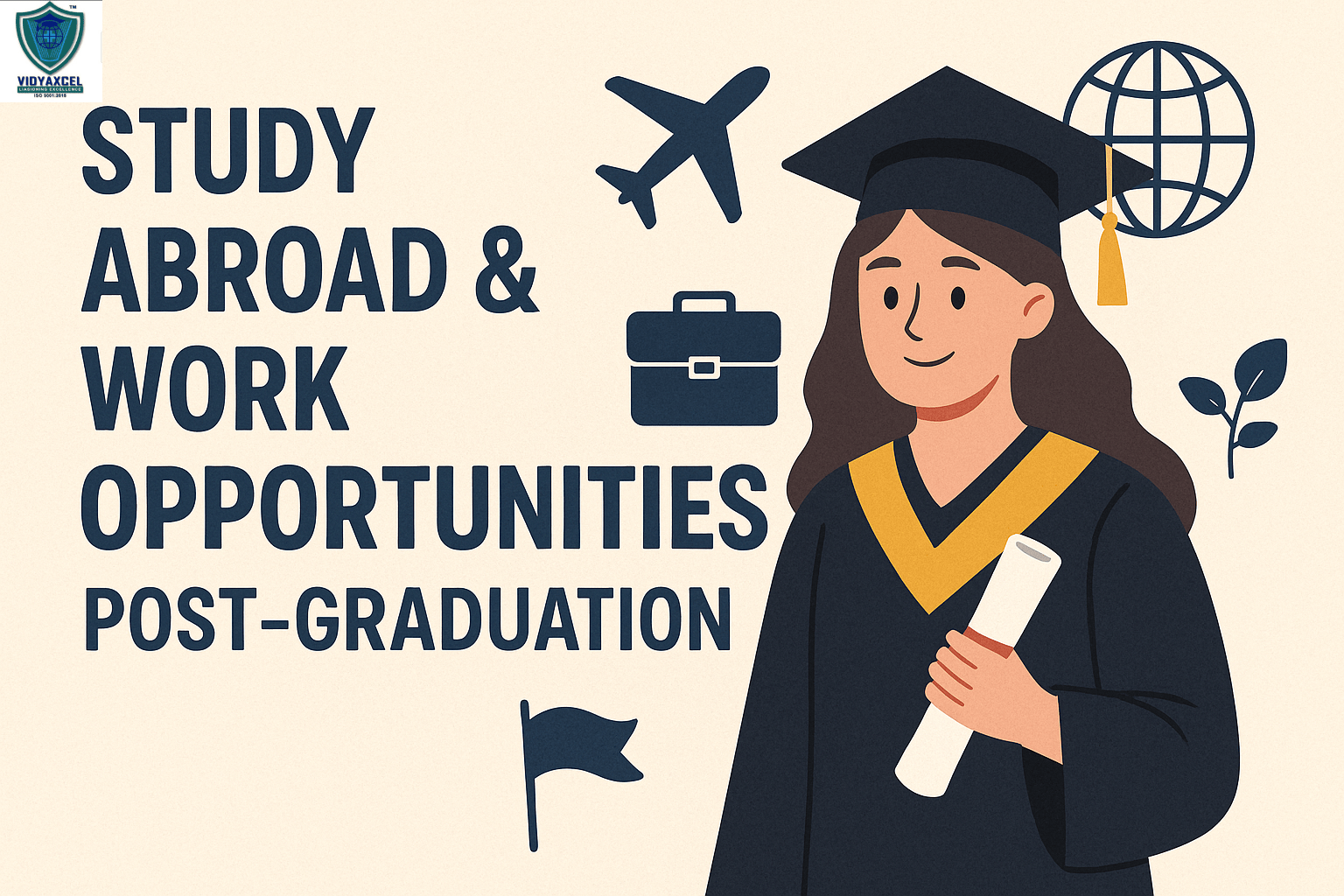Blog Details

19Jun
Study Abroad & Work Opportunities Post-Graduation
In an increasingly globalized world, studying abroad is no longer a luxury but a smart investment in one's future. More than just earning a degree, it offers students an opportunity to gain international exposure, enhance soft skills, build a global network, and most importantly, explore career opportunities in international job markets. But what happens after graduation? Can international students find jobs easily? Which countries offer the best post-study work rights? Is a degree from abroad valued in the job market? This blog explores study abroad options and the post-graduation work opportunities, empowering students and parents to make informed decisions.
Benefits of Studying Abroad
1. Global Exposure & Cultural Intelligence
Living and studying in a foreign country helps students develop adaptability, open-mindedness, and intercultural communication—skills highly valued in the global workforce.
2. Access to Top-Notch Education
Many top universities around the world offer cutting-edge courses, expert faculty, research opportunities, and diverse learning methodologies.
3. Enhanced Employability
International graduates are perceived as independent, self-motivated, and globally aware—traits that stand out to employers.
4. Language & Communication Skills
Learning a new language or improving fluency in English/French/German enhances communication abilities and professional prospects.
5. Opportunities for Permanent Residency
In countries like Canada, Australia, and Germany, international graduates are encouraged to stay through post-study work visas and pathways to permanent residency.
Popular Countries and Their Post-Graduation Work Policies
1. Canada
- Post-Graduation Work Permit (PGWP): Up to 3 years depending on study duration.
- PR Opportunity: Canadian education earns points under the Express Entry system.
- High Demand Fields: IT, healthcare, engineering, education.
2. United Kingdom
- Graduate Route Visa: Allows 2 years (3 for PhDs) of work after graduation.
- Top Industries: Finance, media, research, public health.
- Special Note: Students from top UK universities have global career options.
3. Australia
- Temporary Graduate Visa (Subclass 485): 2 to 4 years depending on qualification.
- PR Opportunities: Points-based system favours Australian qualifications.
- In-Demand Careers: Healthcare, construction, education, IT.
4. Germany
- 18-Month Job-Seeking Visa post-graduation for non-EU students.
- Tuition-Free Education: Public universities offer world-class education with low/no tuition.
- Industry Focus: Engineering, automobile, software, logistics.
5. United States
- OPT (Optional Practical Training): 1-year post-study, 3 years for STEM graduates.
- H1-B Pathway: Job offers can lead to long-term work via H1-B visa.
- Top Hiring Sectors: Tech, finance, healthcare, data analytics.
6. Ireland
- Stay Back Visa: Up to 2 years post-study work for graduate and postgraduate students.
- Career Opportunities: Tech (Dublin is Europe's Silicon Valley), pharma, fintech.
Strategic Steps to Secure Work Post-Graduation
1. Choose the Right Course & University
Look for degrees with employability prospects, co-op programs, or mandatory internships.
2. Gain Work Experience During Study
Take up part-time jobs, summer internships, or teaching assistantships.
3. Build a Global Network
Engage with professors, alumni, and professionals through seminars, LinkedIn, and networking events.
4. Master the Local Job Market
Understand CV styles, interview formats, and work culture of your host country.
5. Utilize Career Services
Most universities abroad offer career counselling, job fairs, resume writing workshops, and recruiter connections.
High-Demand Careers for International Graduates
Here are some globally in-demand roles with promising future outlooks:
- Software Developers & Data Scientists
- Cybersecurity Analysts
- Nurses & Healthcare Professionals
- Renewable Energy Technicians
- Financial Analysts & Accountants
- Digital Marketing Specialists
- UX/UI Designers
- AI/Machine Learning Engineers
- Supply Chain Managers
- Public Health Officers
Challenges Students May Face (And How to Overcome Them)
|
Challenge |
How to Overcome |
|
Language barriers |
Take up language prep before and during studies |
|
Visa limitations |
Understand visa policies early; apply timely |
|
High living costs |
Choose affordable cities/universities; look for part-time jobs |
|
Cultural adjustment |
Join student communities and support groups |
|
Work permit application process |
Attend university visa seminars and consult experts |
Scholarships & Financial Aid for International Students
Securing scholarships can lighten the financial load significantly. Some popular ones:
- Chevening Scholarships (UK)
- DAAD Scholarships (Germany)
- Erasmus+ (EU nations)
- Fulbright Program (USA)
- Vanier Graduate Scholarships (Canada)
- Australia Awards Scholarships
Also check university-specific grants, tuition discounts, assistantships, and external funding bodies.
Conclusion
Studying abroad is not just about getting a degree—it's about transforming your future. When chosen wisely, international education opens the doors to fulfilling careers, personal growth, and cross-border opportunities.
To maximize the return on investment, students should plan early, research job markets, tailor their learning paths, and actively engage with the resources available in their host countries.
FAQs
1. Which country is best for studying and working post-graduation?
Canada and Australia top the list due to their favourable immigration policies and strong job markets. However, Germany, Ireland, and the UK also offer great prospects.
2. Do I need to speak the local language to work post-study?
In non-English-speaking countries like Germany or France, knowing the local language boosts job prospects. However, many international companies operate in English.
3. Can I work while studying abroad?
Yes, most countries allow part-time work during study (usually 20 hours/week) which helps gain experience and support living costs.
4. Is studying abroad worth the investment?
Absolutely, if planned strategically. The return includes better career prospects, international exposure, and the possibility of permanent residency.
5. What are the most employable degrees abroad?
STEM (Science, Technology, Engineering, Mathematics), business, healthcare, and data science degrees tend to be highly employable worldwide.
Our Office: West Bengal, Maharashtra & Delhi.
For More Infomation about admission in Medical, Engineering, Management & Study in Overseas Details.
View Current Study Overseas, Medical, Engineering & Management Admission Details Video.





